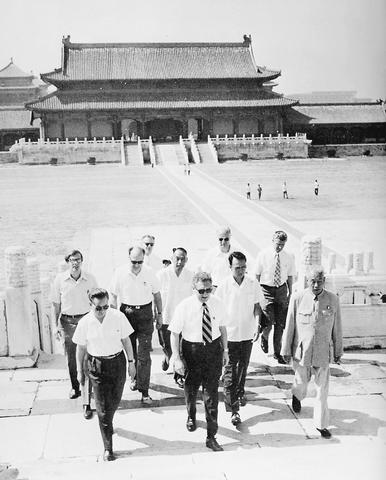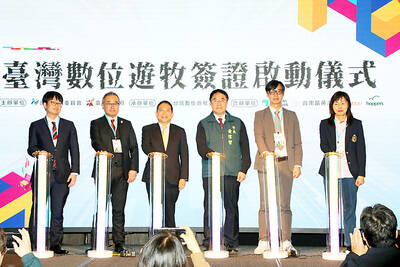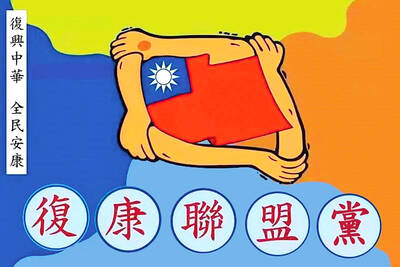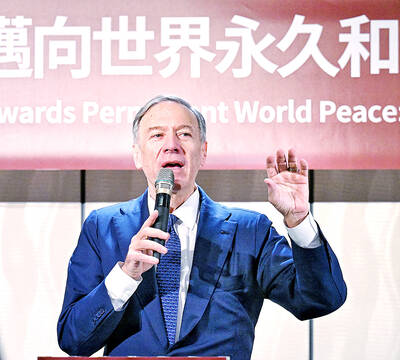The day after the Republic of China lost its UN seat, Frederick Chien (錢復), the foreign ministry's director-general of the Department of North American Affairs, received a phone call from an American boy at Taipei's UN mission located on Second Avenue in New York City.
"He said, `I heard my father say that you lost your seat at the UN. You must be very sad. If you have no place to go, we have rooms at our home. Please come and join us,'" recalled Chien, now president of the Control Yuan, yesterday morning in his office.

PHOTO: FROM THE BOOK 'THE WHITE HOUSE YEARS', BY HENRY KISSINGER
Taiwan's loss of the China seat at the UN 30 years ago was the culmination of a slow erosion in support for the ROC which climaxed in what many scholars call "the collective denial of the ROC's statehood," in 1971. Its subsequent isolation from the international system immediately followed suit.
Conventional wisdom has attributed the loss of the UN seat to the then-KMT government's adamant insistence on declaring itself the sole legitimate government of China, albeit with only de facto control of Taiwan after losing the Chinese civil war on the mainland to the communists in 1949. Some have attributed the diplomatic fiasco to the government's refusal, at least in public, to accept the US-led concept of dual representation under a "two Chinas" option in the UN.
Miscalculation
But recently de-classified US files and insider accounts tell a different story, bringing to light the complex diplomacy that eventually led to Taiwan's departure.
"America's de-classified diplomatic files reveal that Taipei then opposed the idea of dual representation for domestic reasons, but told its allies not to take its own position seriously; Taipei hoped they would support the dual representation proposal even if it involved giving away its seat at the UN Security Council to the Chinese Communists," wrote James Wang (
Beginning in the 1950s, the question of China's representation had surfaced annually on the UN's agenda, with the ROC on Taiwan and the People's Republic of China (PRC) fighting for the seat as the sole legitimate government of all China.
Colored by the Cold War's East-West confrontation, the fight before the final battle in 1971 can be split into two stages.
From 1950 to 1960, Beijing's effort, assisted by the Soviet bloc, was checked in the UN by the means of a moratorium initiated by the US. From 1961 to 1970, Taipei's supporters adopted another device, which declared the matter an "Important Question" requiring a two-thirds majority in the General Assembly before any change could be made regarding membership.
In 1966, Italy proposed the setting up of a committee under the UN to study measures to solve the question of China's representation, but both Taipei and Beijing refused the offer, triggering their allies' opposition to the proposal.
By the spring of 1971, both Taipei and Washington felt "pessimistic" about continuing the "Important Question" approach to safeguarding Taipei's seat, given Beijing's rising influence, wrote Wang, United Daily News' senior correspondent in Washington.
Chien said that the US then suggested to Taipei a simple dual representation model that did not involve Taipei's seat on the UN Security Council as a tactic to guarantee Taipei's representation. The plan was to exclude the question of who would get the Security Council seat from the proposal.
"But by July and August, after surveying its allies, the US realized the model would not garner enough support," Chien recalled.
The final US scheme, according to Chien, included two elements: the so-called "Important Question Variation" and the so-called "Dual Representation Complex."
By its policy of declaring itself the sole legitimate government of all China, a "legal fiction" as some critics described, Taipei's Important Question Variation proposed that to exclude the ROC as a founding member of the UN should be treated as an important question whereas the inclusion of the PRC as a new member should not, "thus opening the UN door to Communist China," Chien recalled.
The Dual Representation Complex proposal involved keeping both Taipei and Beijing in the UN while Beijing took over Taipei's seat on the UN Security Council, Chien said.
Hemmed in
Constrained, Taipei was forced to adopt a dual tactic, differing its public and private positions.
"The ROC government was then unable to tell everybody we were supportive of the Important Question Variation or the Dual Representation Complex because it was against our basic policy. But what the then foreign minister Chou Shu-kai (
In a compelling account of the history in the China Times on Oct. 25 last year, retired ambassador Loh I-cheng (
But in July 1971, amid a Sino-Soviet split, US National Security Advisor Henry Kissinger flew secretly to Beijing to normalize Washington-Beijing relations. The tide of international politics was gradually turning against Taipei.
On Oct. 20th during the UN General Assembly session, Kissinger was again in Beijing to arrange President Richard M. Nixon's visit in the spring, according to Kissinger's account, "leaving the US' UN ambassador George Bush to fight a lone battle [to push for dual represention]," Loh recalled.
Bush, in his memoirs, pointed out the constraints the Sino-US normalization process had imposed upon the US' fight in the UN to push forward the dual representation option.
When it came to the final showdown on Oct. 25, a vote was taken that deemed the "Important Question" rule requiring a two-thirds majority irrelevant, by a vote of 55 for, 59 against, with 15 abstentions.
The "Important Question" fight was lost partly due to a few delegates, such as Belgium, Morocco and Oman, switching their position from support to abstention at the last minute, according to Harry Thayer, a US State Department official, in a 1977 interview.
Bush then proposed amending Albania's proposal to delete related wording that involved expulsion of Taipei from the UN, a motion lost in a subsequent vote.
Foreign minister Chou then declared Taipei's withdrawal from the UN before the Albania proposal was put to a vote.
Wu Yu-shan (
Finally, under resolution 2758, The UN General Assembly decided to oust the ROC and admit the PRC by a vote of 76 for, 35 against, with 17 abstentions.
"The US said in the UN corridor that there were rumors the USSR was going to do its very best to block the entry of the PRC, given the then Sino-Soviet split. But we told the US that was impossible, as both countries basically adhered to communism, despite the conflict between leaders of the two countries," Chien said.
Skullduggery
Another interesting element to the story was the detaining of three delegates -- who were to support Taiwan's position -- by the Soviets.
"As it turned out, the United Arab Emirates, Qatar and Oman, three new UN members, had at first voiced their support for Taiwan prior to the final showdown. But the day the issue was to put to a vote, the delegates of these three countries were nowhere to be found," Chien recalled.
"The next day our ambassador to Kuwait Wang Shih-ming (王世明) found them, and they told him that staffers from the USSR delegation visited them in the early morning [on Oct. 25] to ... take them to a town named White Plains, north of New York City, to buy some gifts until 7pm, claiming things in the city were too expensive," Chien said.
The Soviet diplomats also told them that the question of China's representation would not be put to a vote that evening, thus deferring their return to New York City until 10pm, well after the final showdown.
Both Loh and Chien denounced the argument that dual representation, if passed in 1971, would have ensured Taipei's seat in the UN for good.
"The UN is an amphitheater whose gladiators are nation states, with everybody playing realpolitik. If the dual representation proposal were passed in 1971, Communist China would definitely have refused to enter the UN. We could at most drag things out for another two years or so before being ousted from the UN," Loh wrote.
"After all, the precondition of the PRC's entry into the UN, as stated clearly by the regime, was to expel us first," Chien said. "And the international trend then was that a country that had one-fourth of the world's population should not be excluded from such an international organization."
Loh also added another penetrating point: "Our mistake lay in failing to accept Italy's proposal during 1966 to 1968 when Taipei and Beijing had similar numbers of diplomatic allies. ... When every country gave up the proposal of `two Chinas,' our chance was gone never to return," Loh wrote.

QUIET START: Nearly a week after applications opened, agencies did not announce or promote the program, nor did they explain how it differed from other visitor visas Taiwan has launched a six-month “digital nomad visitor visa” program for foreign nationals from its list of visa-exempt countries who meet financial eligibility criteria and provide proof of work contracts. To apply, foreign nationals must either provide proof that they have obtained a digital nomad visa issued by another country or demonstrate earnings based on age brackets, the Bureau of Consular Affairs said. Applicants aged 20 to 29 must show they earned an annual salary of at least US$20,000 or its equivalent in one of the past two years, while those aged 30 or older must provide proof they earned US$40,000 in

SERIOUS ALLEGATIONS: The suspects formed spy networks and paramilitary groups to kill government officials during a possible Chinese invasion, prosecutors said Prosecutors have indicted seven retired military officers, members of the Rehabilitation Alliance Party, for allegedly obtaining funds from China, and forming paramilitary groups and assassination squads in Taiwan to collaborate with Chinese troops in a possible war. The suspects contravened the National Security Act (國家安全法) by taking photos and drawing maps of key radar stations, missile installations and the American Institute in Taiwan’s headquarters in Taipei, prosecutors said. They allegedly prepared to collaborate with China during a possible invasion of Taiwan, prosecutors said. Retired military officer Chu Hung-i (屈宏義), 62, a Republic of China Army Academy graduate, went to China

AIR DEFENSE: The Norwegian missile system has proved highly effective in Ukraine in its war against Russia, and the US has recommended it for Taiwan, an expert said The Norwegian Advanced Surface-to-Air Missile Systems (NASAMS) Taiwan ordered from the US would be installed in strategically important positions in Taipei and New Taipei City to guard the region, the Ministry of National Defense said in statement yesterday. The air defense system would be deployed in Taipei’s Songshan District (松山) and New Taipei City’s Tamsui District (淡水), the ministry said, adding that the systems could be delivered as soon as the end of this year. The US Defense Security Cooperation Agency has previously said that three NASAMS would be sold to Taiwan. The weapons are part of the 17th US arms sale to

UNITY MESSAGE: Rather than focusing on what Trump said on the campaign trail about Taiwan, Taipei should be willing to engage with the US, Pompeo said Taiwan plays a key role in Washington’s model of deterrence against China, former US secretary of state Mike Pompeo said in a speech in Taipei yesterday. During US president-elect Donald Trump’s first term, “we had developed what we believe was a pretty effective model of deterrence against adversaries who wanted to undermine the set of rules and values that the people of Taiwan and the people of the US hold dear,” Pompeo said at a forum organized by the Formosa Republican Association. “Succeeding in continuing to build this model will not solely rest at the feet of president Trump and his team,